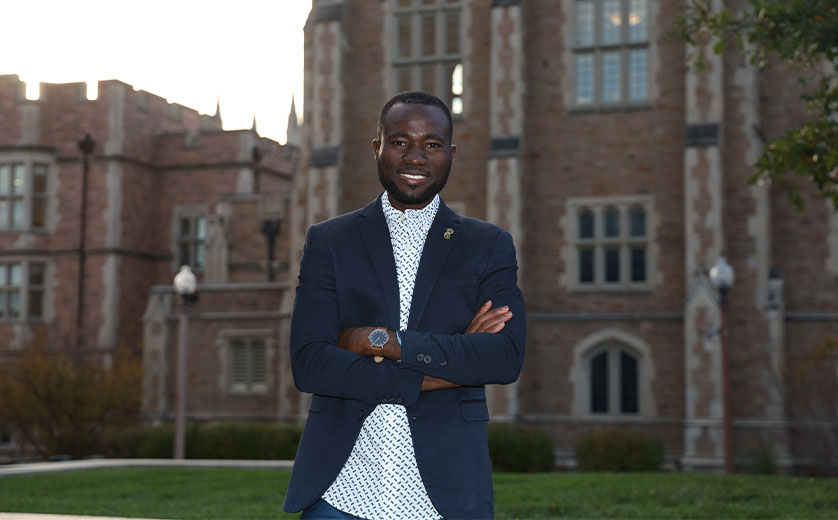Cletus Bijalam Mbalida’s academic journey began at the age of 12, when he attended his first day of school in a makeshift classroom under a tree in northern Ghana. He reached his latest destination May 13 at Francis Olympic Field, where he celebrated receiving his MPH degree from the Brown School and looked forward to publishing his analysis of poverty in Ghana as he works toward a PhD degree. His only regret at that rainy WashU Commencement ceremony was that his late mother couldn’t be there.
“It has been seven months since my mother’s passing, and as I recall our countless moments of burning charcoal in the forest to sell as fuel to raise money for my school fees in the early stages of my academic journey and all the other sacrifices she made, I deeply wish she could have been here to witness and celebrate my graduation.”
Mbalida was born and raised in a rural peasant farming community in Northern Ghana. His father didn’t permit him to attend school, as he needed help at home, where they would arise before dawn and make a torch-lit walk to the fields to get enough done before the scorching sun came up.
Fridays were market days, when there was no field work, and one Friday, he decided to go to the village school, in which schoolchildren brought their own seats under a tree and listened to a teacher at a plywood blackboard. A self-taught reader, Mbalida caught the teacher’s attention, who then confronted Mbalida’s father about why a child nearly past the school-going age was not enrolled. His father finally relented and allowed him to attend.
In high school, he saw his first library. “It had all the resources I lacked,” he recalled. He was accepted at two Ghanaian medical schools but decided instead to pursue mathematics at Berea College in Kentucky, where he reflected on what he wanted to accomplish with his education, finally settling on public health, which he said gives him the chance to do research, drive change and champion impactful policies that truly leave no one behind.
His MPH studies focused on epidemiology and biostatistics, which helped him with his capstone, the course requirement to demonstrate his synthesis of foundational and specialized competencies. This summer he’ll complete his practicum with the Women, Infants and Children (WIC) nutrition program in the Missouri Department of Health and Senior Services. There, he’ll be analyzing data to determine if changes in federal regulations could improve the delivery of nutrition services.
He’ll also be seeking to publish his capstone paper, “Confronting Inequality: Prevalence and Spatial Inequities in Multidimensional Poverty in Ghana.” The paper documents the variety of factors that affect the quality of life beyond money, such as education, geography, and health in a nation where 54% of the populace live in poverty.
“Mbalida’s work was impressive,” said his capstone supervisor, Robert Fitzgerald, Associate Professor of Psychiatry at the Washington University School of Medicine. “He knows what he’s doing, and he’s very passionate about his work,” Fitzgerald said. “When I saw his draft, it was already basically ready for publication. What Cletus did was add spatial disadvantage to his analysis of poverty in Ghana. What he found was that being rural was one of the biggest drivers of multidimensional poverty in Ghana. I highly recommended he submit this for publication.”
Husain Lateef, an assistant professor at the Brown School, was also impressed. He supervised Mbalida’s work as a graduate research assistant whose math expertise helped with the completing a clustering analysis manuscript to explore how cultural strengths are associated with substance use behaviors among Black emerging adults.
“I was really excited to work with him,” Lateef said. Mbalida is the second author of the paper, which was finished last month. “He’s a wonderful person,” Lateef said. “He’s very kind, and was able to explain complex mathematical analyses that other students could understand.”
Mbalida’s thoughts upon graduating included the advice of his first teacher under that tree in Ghana. “He encouraged me to commit myself entirely to my studies and never disappoint him, words that have stuck with me,” he said.
